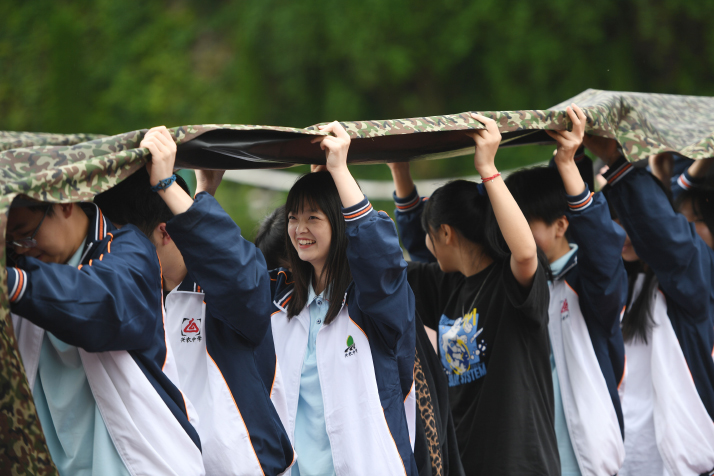
Do you ever feel, feel so paper thin; like a house of cards, one blow from caving in?
When Nana (username), a blogger on China’s wildly popular lifestyle and e-commerce app Xiaohongshu (Little Red Book), first heard the lyrics to American singer Katy Perry’s 2010 song Firework, the words immediately resonated with her. “Especially after a long day at work, constantly being bombarded with comments from a ‘not so nice’ boss and being annoyed by colleagues. Those moments made me want to instantly recharge,” she wrote on a poster published on October 19 to promote her latest livestream groupchat themed Self-Care on the platform, which mainly targets millennials and Gen Zs.
“Sometimes, it almost seems impossible to have a little ME time between all the tasks we need to accomplish in a day,” she added in a post on her account. “When was the last time you turned off your phone and just focused on YOUR life?”
Thirty-something Nana is a freelancer originally hailing from China’s Macao Special Administrative Region (SAR). She moved to the Chinese mainland after getting married and now lives in the city of Nanjing, capital of Jiangsu Province. Together with two other hosts, Jasper (username), an education professional from the southwestern Chinese province of Yunnan who is now a Ph.D. student in China’s Hong Kong SAR, and Jenny (username), a certified counselor based in Singapore, she initiated a series of livestream talks called Space Hug to discuss the psychological difficulties different people face.
This part-time career evolved rather “unexpectedly” from an online chat between the three of them, who are actually strangers in real life. Their Space Hug conversations soon got pinned to Little Red Book’s front page and their fourth livestream was viewed over 100,000 times. This boost was a huge encouragement and catalyst for them to develop it into a safe space for anyone to share their stories.
It’s sometimes just easier to talk to someone you don’t know. “But since we don’t know each other in real life, it’s also hard to know where the boundaries are,” Nana told Beijing Review. “I think this is why we decided to initiate this [online English-language psychology corner]—for better privacy protection.”
With the guest participation of experienced professionals in the field upon the invitation of the hosts, Space Hug raises awareness of mental health and is a place to share and listen, especially for young people in the workforce who live alone, making millennials and Gen Zs the corner’s main participants. The most popular topics include relationships with parents, partners or colleagues.
But what still shocks the organizers is the lack of real knowledge about mental health.
“Many people are talking about depression nowadays, but they don’t have a deep understanding of what it actually is. And sometimes they just label themselves as being depressed, but they’re actually not, or they have different types of mental health issues, but they only know the term ‘depressed,’ so that becomes their self-diagnosis,” Nana said.
“If we realize that the listeners interacting with us are experiencing severe depression, we will suggest they seek professional help as soon as possible,” Jasper said. Meanwhile, the space also provides some small tools, tips or tricks to help in certain urgent situations.
A range of remedies
But the English-language counseling does require some serious language skills on the part of anyone who turns to Space Hug for a comfort zone and constructive feedback.
Young people generally prefer to immerse themselves in nature or outdoor activities to take a break from their busy daily schedules, especially those residing in cities.
The things that make young people feel “healed” can be roughly divided into five categories: cute small animals, ideal lifestyles, social interaction, the natural environment and cultural creations, according to the research findings of a paper titled Why Not Have Some Tea: The Healing Psychological Experience of Contemporary Youth published by the School of Humanities and Social Sciences, Beijing Forestry University.
“Contact with nature is an important factor that positively affects our mental wellbeing,” Li Huizhong, a lecturer at Beijing Normal University, told China Youth Daily newspaper. Studies have shown that seeing nature’s grandeur, think large trees or snow-capped mountains, can make people feel smaller. “This sense of smallness is also related to a decrease in negative emotions toward oneself.”
“Being in touch with nature reinforces psychological healing,” Li added. She further explained that engagement with nature often involves physical activity, which in turn can help individuals escape feelings of boredom and experience brief moments of relaxation.
But those who prefer indoor lifestyles also have several remedies to turn to and keep boredom at bay. Some like to cheer themselves up by embellishing their home decor with some new, creative input. Others choose to do something that requires their undivided attention such as paper cutting, knitting, crocheting, painting, yoga and so on.
The process of doing handicrafts or decorating a room allows the individual to focus on the task at hand and forget all about time, thus achieving the effects of anxiety relief. And self-healing.
Minor concerns
According to a thesis titled Pros & Cons: Impacts of Social Media on Mental Health, published in BMC Psychology journal in July, the use of social media significantly impacts people’s mental wellbeing. It can enhance connection, increase self-esteem and improve a sense of belonging. But it can also lead to tremendous stress, pressure to compare oneself to others and an increased sense of sadness and isolation when people feel like they don’t measure up to what they’re seeing online.
Millennials are considered digital natives, having learned at a young age how to navigate the Internet and use digital devices. News platforms are a substantial part of their online lives. While for Gen Zs, and younger people, social media is one of the main channels through which they explore the world—and themselves.
The 49th Statistical Report on the Development of the Internet in China published by the China Internet Network Information Center (CNNIC) in February 2022 showed the average weekly Internet usage per capita in the country reached 28.5 hours in December 2021. This is 2.3 hours more than in December 2020, indicating that the Internet has become deeply integrated into everyday life.
What’s more, underage people living in different areas have different preferences when going online, the report said. Urban minors show a significantly higher proportion of using search engines, social networking sites, news platforms and online shopping, all services with strong social attributes. But their rural peers tend to spend more time on leisure and entertainment content such as short videos and animation, and less on educational and information platforms.
In the future, the comprehensive development of digital literacy for minors, especially in the era of artificial intelligence, needs to improve progressively, according to specialists contributing to the report.
“Minors are highly susceptible to the influence of mobile Internet and smart environments. And to ensure the healthy psychological development of minors, a comprehensive and objective analysis of the unprecedented development opportunities and risks posed by generative artificial intelligence, in particular, is an urgent task in this era,” said Fang Zengquan, a lecturer at the School of Journalism and Communication at Beijing Normal University, in the report.
But overall, a major problem in Chinese society is the stigma still attached to mental health issues—the result of a lack of understanding of mental wellness.
Today, more and more Chinese social media platforms, along with their resident influencers, are promoting or sharing constructive content on mental health. Among them is, for example, Anjiu (username), a native Beijinger who studied abroad. She has opened up about her healing process from depression online, offering detailed concerns and suggestions for others with similar problems.
Space Hug’s Jasper was born in a small village in Yunnan. He is more concerned about young people in rural areas, where medical facilities and staff may not have the ability or expertise to help those struggling with mental health. What’s more, due to social stigma, people there may still feel ashamed if they encounter psychological problems. “But one positive sign is that hospitals are setting up psychology departments,” Jasper said.
“I was very surprised to hear how badly some people with mental health issues were treated. That’s what keeps our Space Hug initiative going, even though it’s time- and energy-consuming for sure,” Nana added. –The Daily Mail-Beijing Review news exchange item




